
Sgt. Pepper's Lonely Hearts Club Band is the eighth studio album by the English rock band the Beatles. Released on 26 May 1967, Sgt. Pepper is regarded by musicologists as an early concept album that advanced the roles of sound composition, extended form, psychedelic imagery, record sleeves, and the producer in popular music. The album had an immediate cross-generational impact and was associated with numerous touchstones of the era's youth culture, such as fashion, drugs, mysticism, and a sense of optimism and empowerment. Critics lauded the album for its innovations in songwriting, production and graphic design, for bridging a cultural divide between popular music and high art, and for reflecting the interests of contemporary youth and the counterculture.

Sir George Henry Martin was an English record producer, arranger, composer, conductor, and musician. He was commonly referred to as the "fifth Beatle" because of his extensive involvement in each of the Beatles' original albums. Martin's formal musical expertise and interest in novel recording practices facilitated the group's rudimentary musical education and desire for new musical sounds to record. Most of their orchestral and string arrangements were written by Martin, and he played piano or keyboards on a number of their records. Their collaborations resulted in popular, highly acclaimed records with innovative sounds, such as the 1967 album Sgt. Pepper's Lonely Hearts Club Band—the first rock album to win a Grammy Award for Album of the Year.

Geoffrey Ernest Emerick was an English sound engineer and record producer who worked with the Beatles on their albums Revolver (1966), Sgt. Pepper's Lonely Hearts Club Band (1967) and Abbey Road (1969). Beatles producer George Martin credited him with bringing "a new kind of mind to the recordings, always suggesting sonic ideas, different kinds of reverb, what we could do with the voices".
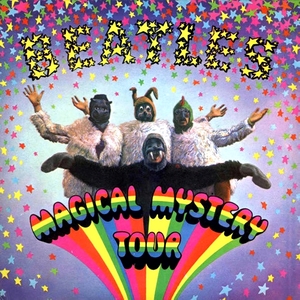
Magical Mystery Tour is a record by the English rock band the Beatles that was released as a double EP in the United Kingdom and an LP in the United States. It includes the soundtrack to the 1967 television film of the same name. The EP was issued in the UK on 8 December 1967 on the Parlophone label, while the Capitol Records LP release in the US and Canada occurred on 27 November and features an additional five songs that were originally released as singles that year. In 1976, Parlophone released the eleven-track LP in the UK.

"Lucy in the Sky with Diamonds" is a song by the English rock band the Beatles from their 1967 album Sgt. Pepper's Lonely Hearts Club Band. It was written primarily by John Lennon with assistance from Paul McCartney, and credited to the Lennon–McCartney songwriting partnership. Lennon's son Julian inspired the song with a nursery school drawing that he called "Lucy – in the sky with diamonds". Shortly before the album's release, speculation arose that the first letter of each of the nouns in the title intentionally spelled "LSD", the initialism commonly used for the hallucinogenic drug lysergic acid diethylamide. Lennon repeatedly denied that he had intended it as a drug song, and attributed the song's fantastical imagery to his reading of Lewis Carroll's Alice in Wonderland books.

"A Day in the Life" is a song by the English rock band the Beatles that was released as the final track of their 1967 album Sgt. Pepper's Lonely Hearts Club Band. Credited to Lennon–McCartney, the opening and closing sections of the song were mainly written by John Lennon, with Paul McCartney primarily contributing the song's middle section. All four Beatles played a role in shaping the final arrangement of the song.

"When I'm Sixty-Four" is a song by the English rock band The Beatles, written by Paul McCartney and released on their 1967 album Sgt. Pepper's Lonely Hearts Club Band. It was one of the first songs McCartney wrote; he was about 14, probably in April or May 1956. The song was recorded in a key different from the final recording; it was sped up at the request of McCartney to make his voice sound younger. It prominently features a trio of clarinets throughout.
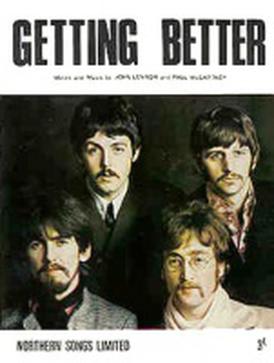
"Getting Better" is a song by the English rock band the Beatles from their 1967 album Sgt. Pepper's Lonely Hearts Club Band. It was written mainly by Paul McCartney, with some of the lyrics written by John Lennon, and credited to the Lennon–McCartney partnership.

"Within You Without You" is a song by the English rock band the Beatles from their 1967 album Sgt. Pepper's Lonely Hearts Club Band. Written by lead guitarist George Harrison, it was his second composition in the Indian classical style, after "Love You To", and inspired by his stay in India in late 1966 with his mentor and sitar teacher Ravi Shankar. Recorded in London without the other Beatles, it features Indian instrumentation such as sitar, tambura, dilruba and tabla, and was performed by Harrison and members of the Asian Music Circle. The recording marked a significant departure from the Beatles' previous work; musically, it evokes the Indian devotional tradition, while the overtly spiritual quality of the lyrics reflects Harrison's absorption in Hindu philosophy and the teachings of the Vedas.
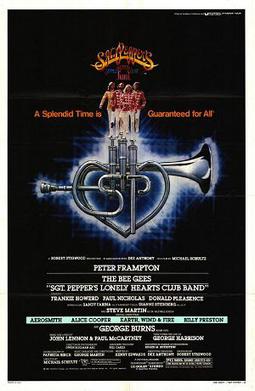
Sgt. Pepper's Lonely Hearts Club Band is a 1978 American jukebox musical comedy film directed by Michael Schultz, written by Henry Edwards and starring an ensemble cast led by Peter Frampton and the Bee Gees. Depicting the loosely constructed story of a band as they wrangle with the music industry and battle evil forces bent on stealing their instruments and corrupting their hometown of Heartland, the film is presented in a form similar to that of a rock opera, with the songs providing "dialogue" to carry the story. George Burns has most of the spoken lines that act to clarify the plot and provide further narration but there are a few other lines throughout the movie.

"Sgt. Pepper's Lonely Hearts Club Band" is a song written by Paul McCartney, credited to Lennon–McCartney, released in 1967 on the album of the same name by the Beatles. The song appears twice on the album: as the opening track, and as "Sgt. Pepper's Lonely Hearts Club Band (Reprise)", the penultimate track. As the title song, the lyrics introduce the fictional band that performs on the album.

"Fixing a Hole" is a song by the English rock band the Beatles from their 1967 album Sgt. Pepper's Lonely Hearts Club Band. It was written by Paul McCartney and credited to Lennon–McCartney.

"Good Morning Good Morning" is a song by the English rock band the Beatles from their 1967 album Sgt. Pepper's Lonely Hearts Club Band. It was written by John Lennon and credited to Lennon–McCartney. Inspiration for the song came to Lennon from a television commercial for Kellogg's Corn Flakes. Another reference to contemporary television was the lyric "It's time for tea and Meet the Wife", referring to the BBC sitcom.

Giles Martin is an English record producer, songwriter, composer and multi-instrumentalist. His studio recordings, stage shows, TV and film works have been critically acclaimed and commercially successful around the world. He is the son of Beatles producer George Martin and half-brother of actor Gregory Paul Martin.

Bull of Heaven is an American experimental/avant-garde group. Originally consisting of Neil Keener and Clayton Counts with help from various contributors. After Counts' death, Keener remains the only member.

Easy Star All-Stars is a reggae collective founded in 1997 by Michael Goldwasser, Eric Smith, Lem Oppenheimer and Remy Gerstein of New York City-based Easy Star Records. The band is known for its reinterpretations of classic albums in reggae style. Their first album, released in 2003, was Dub Side of the Moon, an interpretation of Pink Floyd's 1973 album Dark Side of the Moon. This was followed by Radiodread (2006), an interpretation of Radiohead's 1997 album OK Computer;Easy Star's Lonely Hearts Dub Band (2009), an interpretation of the Beatles' 1967 album Sgt. Pepper's Lonely Hearts Club Band; and Easy Star's Thrillah (2012), an interpretation of Michael Jackson's 1982 album Thriller.

Sgt. Pepper's Lonely Hearts Club Band is a double album produced by George Martin, featuring covers of songs by the Beatles. It was released in July 1978, as the soundtrack to the film Sgt. Pepper's Lonely Hearts Club Band, which starred the Bee Gees, Peter Frampton and Steve Martin. This work has received universally negative reviews and is considered some of the worst music ever released.

Clayton Counts was an American musician and composer, a former DJ, and one half of the experimental band Bull of Heaven.
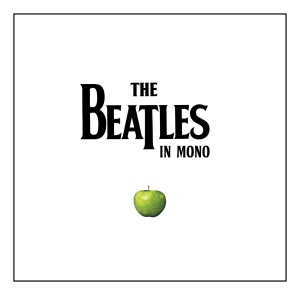
The Beatles in Mono is a boxed set compilation comprising the remastered monaural recordings by the Beatles. The set was released on compact disc on 9 September 2009, the same day the remastered stereo recordings and companion The Beatles were also released, along with The Beatles: Rock Band video game. The remastering project for both mono and stereo versions was led by EMI senior studio engineers Allan Rouse and Guy Massey.
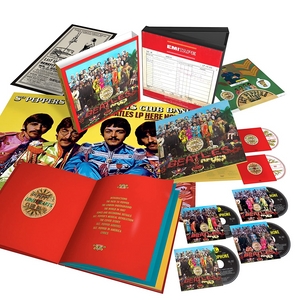
Sgt. Pepper's Lonely Hearts Club Band: 50th Anniversary Edition is an expanded reissue of the 1967 album Sgt. Pepper's Lonely Hearts Club Band by the English rock band the Beatles. It was released on 26 May 2017, the album's 50th anniversary. It includes a new stereo remix of the album by Giles Martin, the son of Beatles producer George Martin.


















